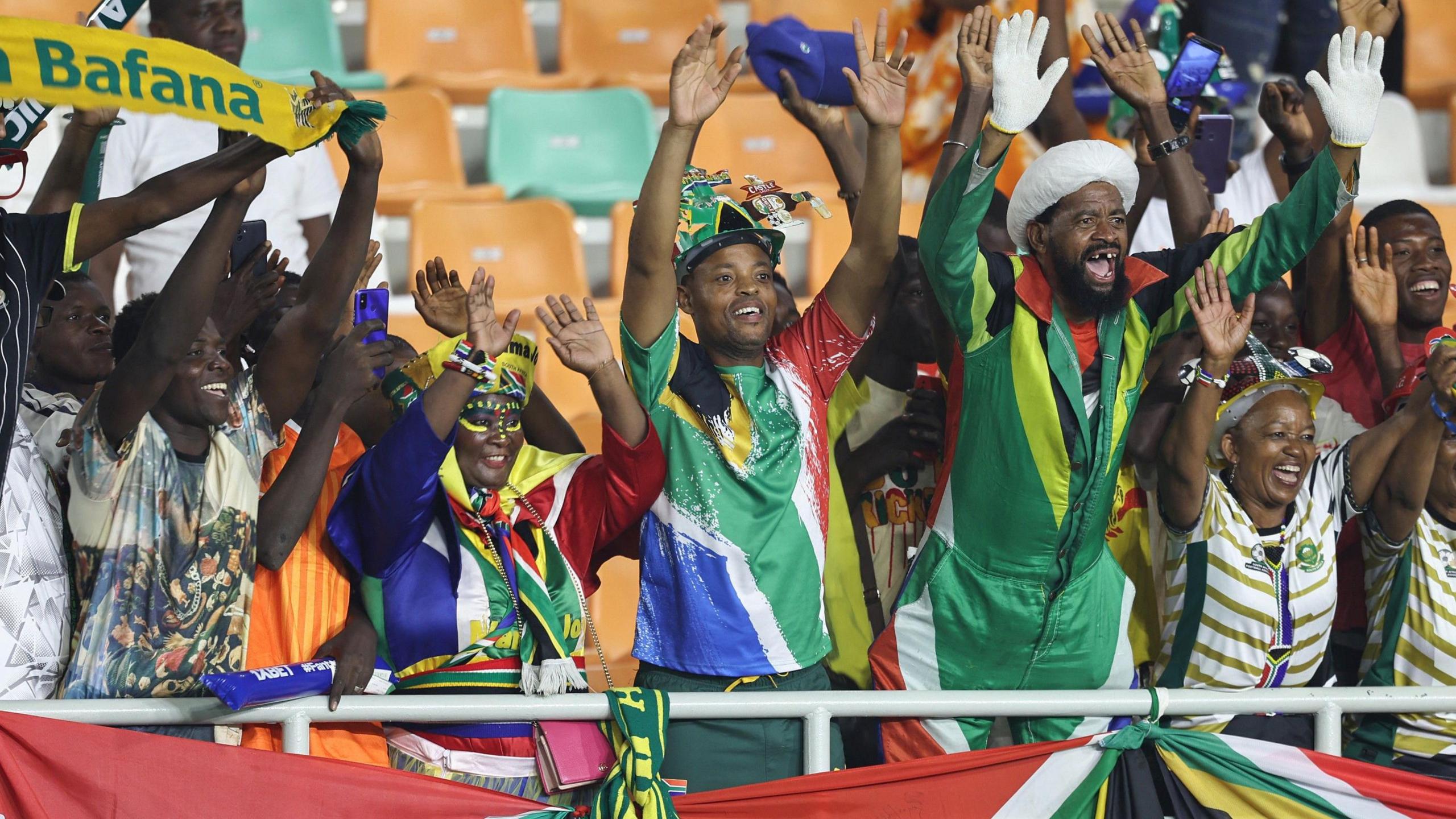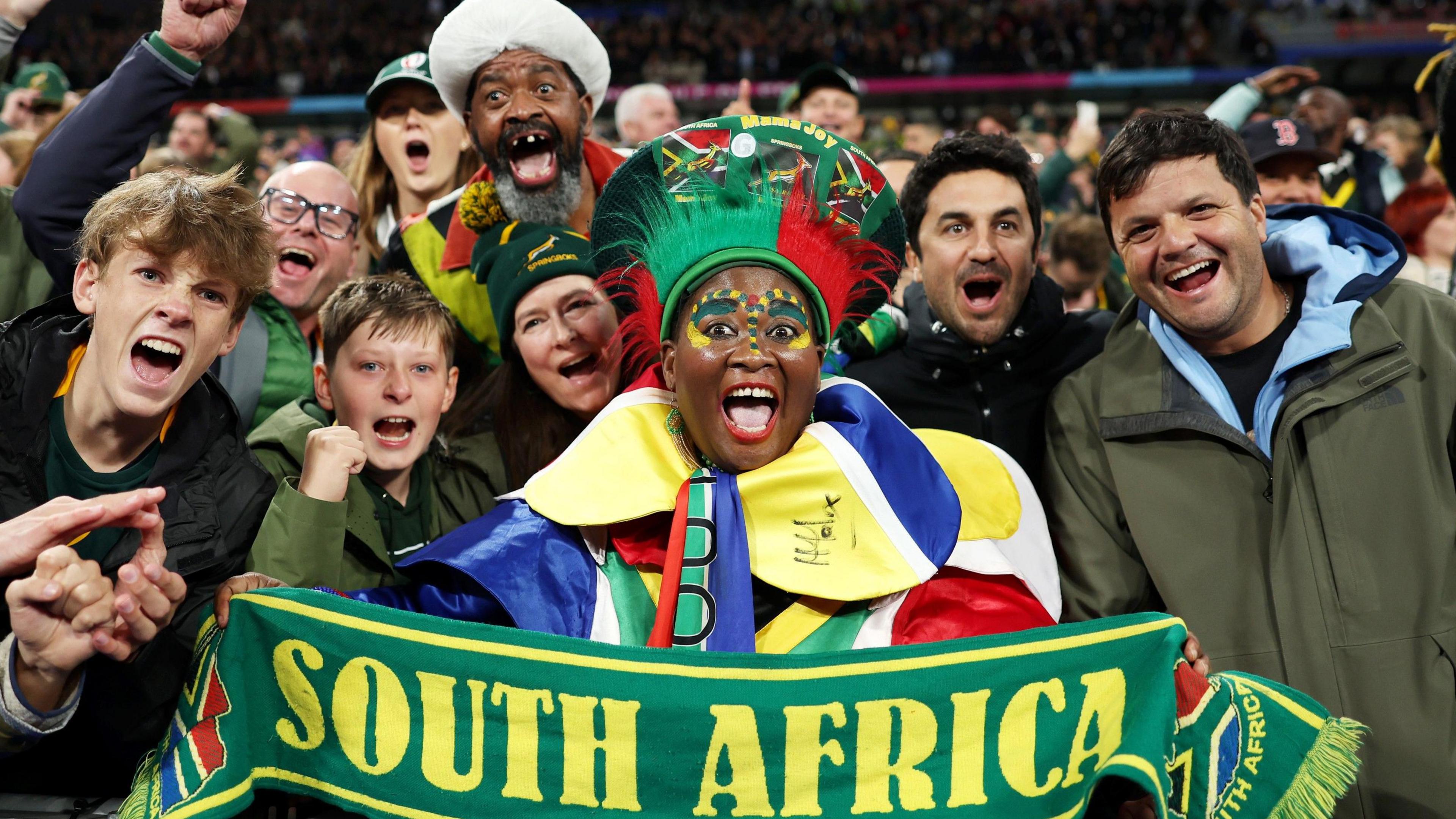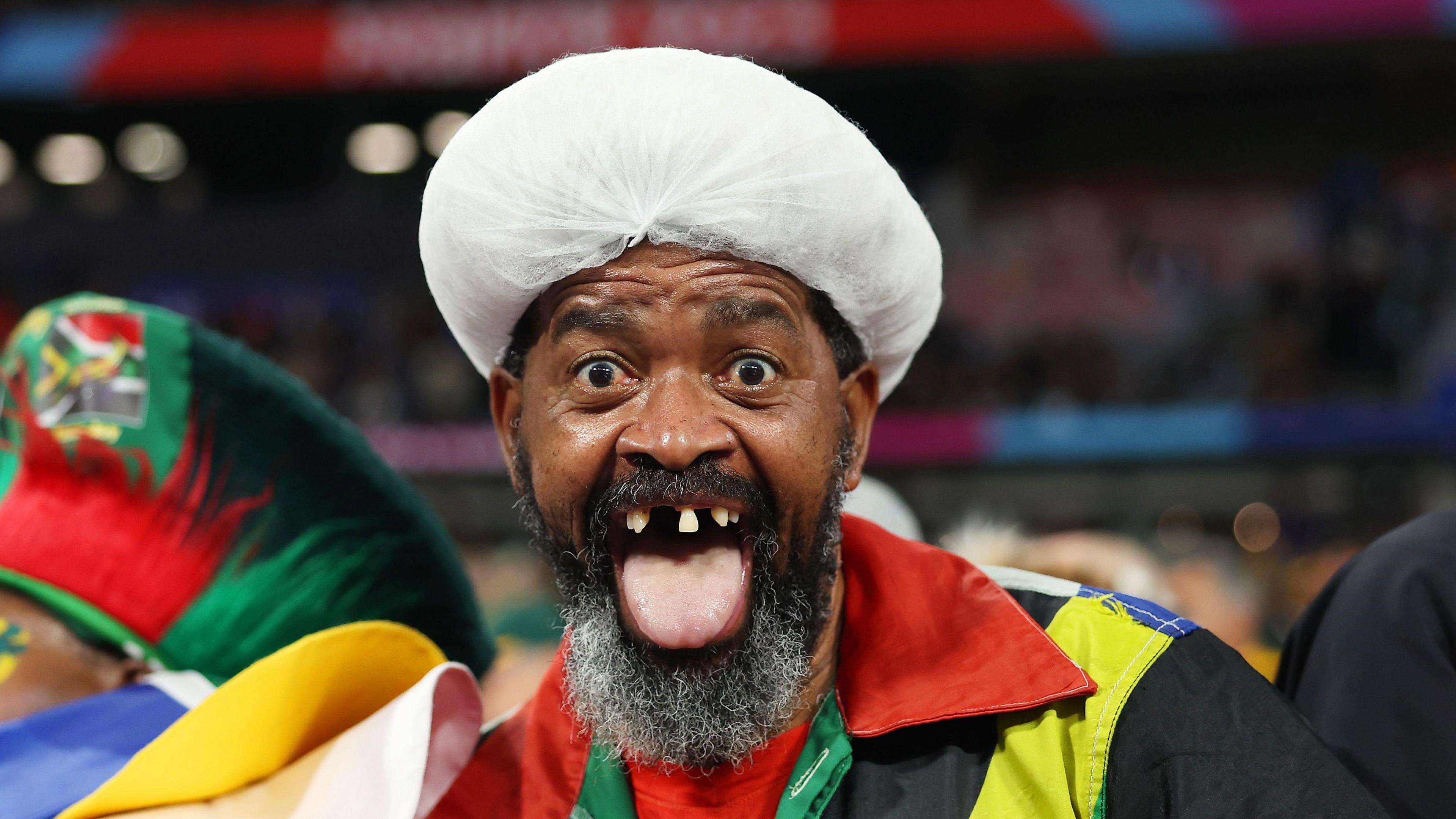Mixed reaction as South Africa dumps superfans

South African teams are often supported by their superfans at international sports events
- Published
The news that South Africa's new sports, art and culture minister, Gayton McKenzie, will be cutting funding for so-called superfans has provoked a mixed reaction in the country.
The Rainbow Nation has a long history of superfans - vocal supporters dressed in bright colours who attend major sports events. Some have become so popular they are recognisable around the world.
In the past, the government has paid for these fans to attend events such as the Africa Cup of Nations and the Rugby World Cup.
But McKenzie, the charismatic and controversial leader of the Patriotic Alliance party, which captured 2.06% of the vote during May’s general election, believes the money can be better spent elsewhere.
"I have stopped all trips for superfans. We have athletes and artists who are struggling to raise money to attend sporting events and exhibitions, how do we justify paying for fans?" he said in a post on social media., external
"We shall no longer be paying for these trips and will use that money where it's needed the most."
In another break from the past, McKenzie also vowed to provide detailed information on the amount of government money used to fund superfans.
"The time where a select connected few benefit is over," he said.
Who are the superfans?

Superfans Mama Joy Chauke and Botha Msila both attended the 2023 Rugby World Cup in France
"Superfan" is a term used in South Africa to describe followers of a sports team who become well known because they regularly attend live matches.
With many South Africans unable to afford ticket prices, especially for events played in other cities, for some the uber-passionate superfans serve as a surrogate symbol of their support.
Their history dates back to the early years of democracy in the 1990s, though they have become increasingly popular with the rise of social media.
Mama Joy Chauke, often known simply as Mama Joy, and Botha Msila are two of the most high-profile superfans.
Chauke, who has more than 77,000 followers on Instagram, started her career in the 1990s as a supporter of football club Orlando Pirates.
Because of her passion, charisma and elaborate dress, she often attracts the attention of the cameras.
Chauke's popularity extends beyond South Africa. Despite her country not qualifying for the 2022 men’s World Cup in Qatar, she was chosen by Fifa to represent Africa at the competition and was voted Best Fan Leader by the organising committee.
Msila, who rose to fame as a supporter of the now defunct football club Bloemfontein Celtic, made headlines in 2019 after attempting to hitch-hike from Cape Town to Cairo to attend the Africa Cup of Nations.
His journey ground to a halt at the Kenya-Ethiopia border because of visa issues, but he was able to make it to the tournament after a South African broadcaster paid for his flight and the South African Embassy in Nairobi secured his visa.
AFCON 2019: South Africa fan in hitch-hike adventure to Egypt
At this year's Nations Cup in Ivory Coast, Msila gave BBC Sport Africa his top tips for becoming a superfan.
"You need to be energetic all the time, support the team for 90 minutes, no complaints," he said.
"Be patriotic and know that your team or your country must come first," he added, while also stating that superfans need their own distinctive costume and must "always wear your colours" in order to stand out from other fans.
As two of the best-known superfans in South Africa, Chauke and Msila attract regular partnerships, funding and attention - something only a select few can manage.
This February, government records published by civil rights organisation Afriforum, external showed that South African taxpayers contributed at least R1.3m ($72,000) (£56,000) to fund trips for the pair to the 2023 Rugby World Cup in France.
Following the government announcement that it plans to end such funding, Msila told BBC Sport Africa that he plans to meet McKenzie to discuss the way forward.
Chauke has said she will only comment once McKenzie addresses her specifically.
"I can't dwell on things written on social media. There are a lot of superfans," she told BBC Sport Africa.
"Until I talk to him, I won't say anything."

Botha Msila is a popular superfan in South Africa
Best use of funds?
With South Africa’s ongoing economic struggles and its high youth unemployment rate, some have called for money to be spent in ways that empower the entire population, not just a select few.
The issue of Chauke and Msila receiving public funds was initially raised in 2023 by the now suspended Democratic Alliance (DA) MP Renaldo Gouws.
He criticised the government, saying he felt the money should be given to other fans, most of whom cannot afford to travel abroad.
“Mama Joy has attended three events in the last 12 months on behalf of taxpayers,” Gouws posted on X, external.
“No room for other “superfans”? Always the same “tannie” (aunty)? Sounds a bit unfair, doesn’t it.”
The 41-year-old also claimed that superfan funding was reserved for people aligned to the nation’s largest political party, the African National Congress (ANC), outlining his belief that Chauke had publicly campaigned for the ANC, which lost its majority in the recent general election.
Gouws, a former ward councillor from Gqheberha (formerly Port Elizabeth), was sworn in as an MP after the election, but was then suspended when a controversial video from 2010 resurfaced online in which he used racist language against black South Africans.
Though superfans have attracted criticism, their supporters say they act as cultural diplomats and can unite and inspire the nation.
Youth activist Edgar Legoale, who uses football as a tool for empowerment through the Edgar Legoale Foundation, criticised McKenzie’s decision as being “emotional and short-sighted”, external.
He described Chauke and Msila as “invaluable not just for the players” but for South Africans at home as well.
Others have praised Chauke for her passion, which began before the advent of social media when there were fewer opportunities to generate income from being a superfan.
“Mama Joy became a superfan way before the government even took notice of her. The government took notice of her because they saw how instrumental it is for our sportsmen and women to see their colours reflected in the audience of their spectators,” wrote one backer on social media.
It is often said that sport is one of the few things that unites South Africa, but the issue of their funding looks like it will continue to be divisive.